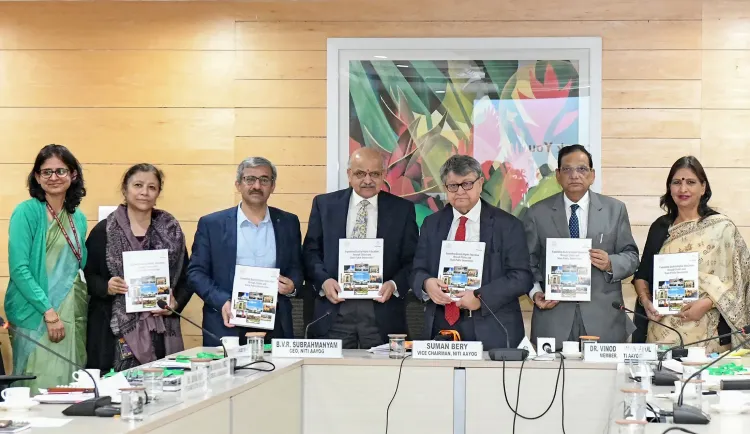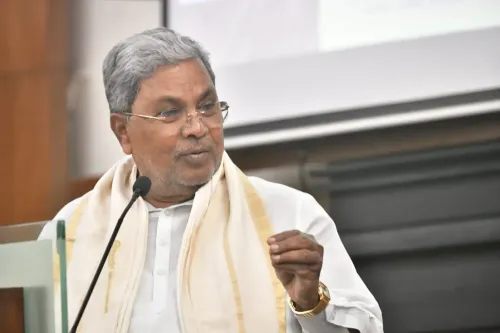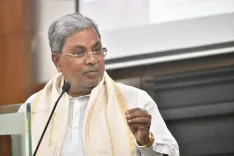NITI Aayog’s Policy Report Outlines Ambitious Higher Education Goals

Synopsis
Key Takeaways
- Quality: Enhance research and pedagogy.
- Funding: Improve financial autonomy and infrastructure.
- Governance: Revise governance structures and empower councils.
- Employability: Strengthen university-industry ties and foster entrepreneurship.
- Performance Indicators: Track progress with over 125 indicators.
New Delhi, Feb 10 (NationPress) A revolutionary policy document named ‘Expanding Quality Higher Education through States and State Public Universities’ was unveiled on Monday, offering a thorough exploration of the hurdles and prospects within India’s higher education framework.
The report was introduced by Suman Bery, Vice Chairman of NITI Aayog, along with BVR Subrahmanyam, CEO of NITI Aayog, and other senior officials.
It provides an in-depth analysis of the changes in higher education over the past decade, particularly focusing on the objectives set forth in the National Education Policy (NEP) 2020. Additionally, it lays out a series of policy suggestions designed to enhance the standards of education, funding, management, and employability in these institutions.
“We must ensure that our higher education system is not only expanding but also providing exceptional quality,” stated Suman Bery, Vice Chairman of NITI Aayog, during the report’s unveiling. “This document highlights crucial areas where action is imperative to elevate the quality, accessibility, and global standing of our state public universities.”
This report marks a pioneering effort, featuring a data-driven assessment of the performance of SPUs and drawing insights from discussions with officials from 20 states and UTs, 50 Vice Chancellors, senior academics, and leaders of State Higher Education Councils. It encompasses over 80 policy recommendations across four pivotal domains: Quality, Funding & Financing, Governance, and Employability, along with a comprehensive implementation roadmap that outlines short-term, medium-term, and long-term strategies.
Key policy suggestions outlined in the NITI Aayog report focus on the following vital areas:
Quality
The report emphasizes the need to bolster research capabilities and enhance “pedagogy” in SPUs. Major recommendations include launching a National Research Policy, establishing Centres of Excellence in clusters of SPUs to address local issues, and fostering Humanities Research. It also advocates for the establishment of Multidisciplinary Education and Research Universities (MERUs) to close gaps in research and education.
“To fortify the research ecosystem in India, we must ensure that SPUs serve as both educational institutions and centers of innovation and entrepreneurship,” remarked an official.
Funding & Financing
The report underscores the necessity of augmenting financial independence for SPUs and enhancing their infrastructure. Suggestions include creating State-level Infrastructure Finance Agencies, promoting tax exemptions for SPUs, and incentivizing CSR contributions to bolster infrastructure. It also recommends reassessing utility rates for SPUs to lower operating expenses.
Governance
A primary emphasis of the report is on refining governance frameworks within SPUs. It recommends developing a State-level Higher Education Vision for 2047 and empowering state councils for higher education akin to the University Grants Commission (UGC). Additional reforms include increasing the autonomy of SPUs regarding administrative issues and revamping the faculty recruitment process.
“We need to enact structural changes that grant SPUs the liberty to innovate while ensuring transparency and accountability,” stated Aayog officials.
Employability
This area receives significant focus in the report. To boost employability, it recommends strengthening partnerships between universities and industries, as well as enhancing internship and apprenticeship opportunities for students. The report also highlights the necessity of entrepreneurship and innovation initiatives to motivate students to become job creators rather than merely job seekers.
“Employability cannot be an afterthought. We must integrate industry-relevant curricula and emphasize holistic student development to prepare them for future challenges,” remarked members of the NITI Aayog team.
The report concludes with over 125 Performance Success Indicators to assess the progress of these recommendations. These indicators will aid in monitoring the success of initiatives related to quality, funding, governance, and employability, ensuring accountability for states and SPUs in their contributions to enhancing quality higher education.









